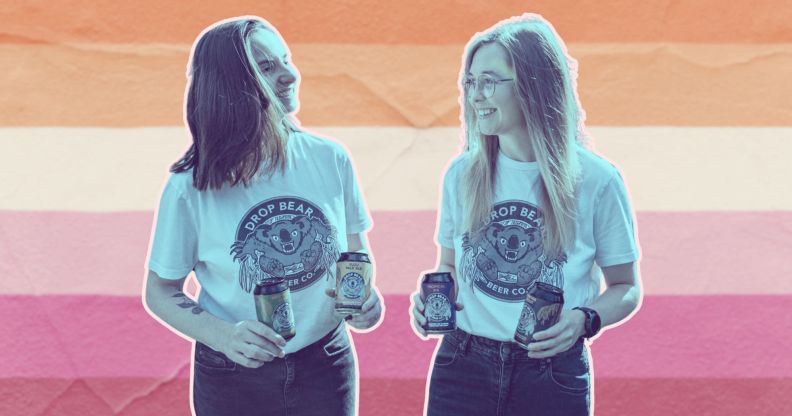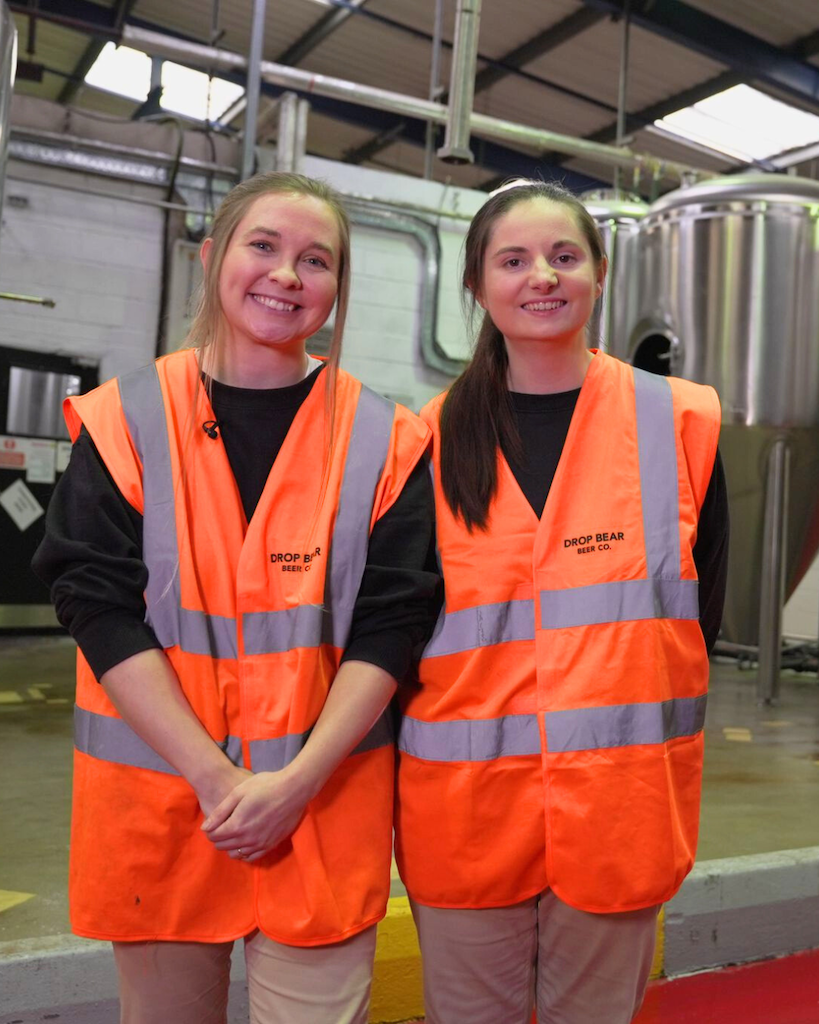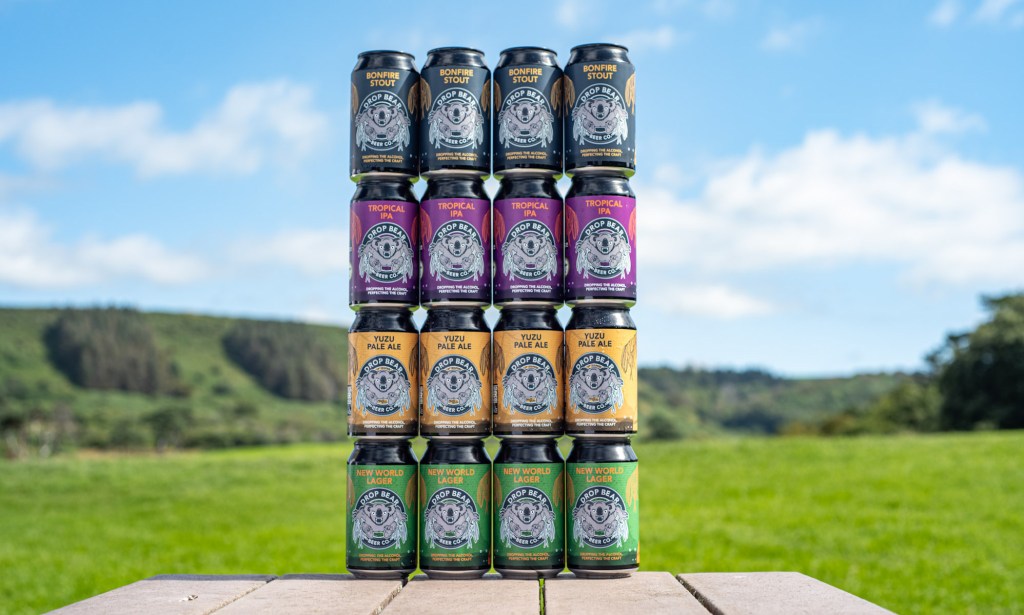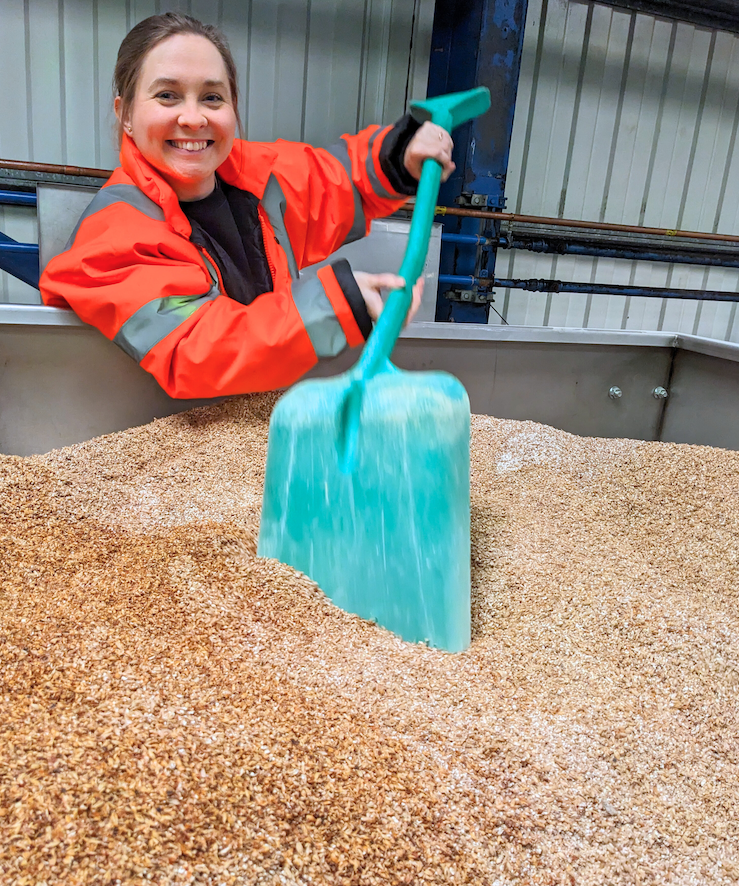Lesbian couple’s non-alcoholic brewery is challenging craft beer rivals – and stereotypes

Joelle Drummond (right) co-founded Drop Bear Beer Company with her wife Sarah in 2019. (Drop Bear Beer Co/PinkNews)
Joelle Drummond, the co-founder of one of the UK’s largest non-alcoholic breweries, has told PinkNews how she overcame her lack of confidence and reticence to “put herself out there” as a lesbian businesswoman and now believes representation is vital.
With more than 1,700 microbreweries in the UK, it’s no secret that the British have a passion for stouts, lagers and pale ale. Behind the pints, kegs and bottles, there is often a stereotypical portrait of brew-masters: a tall man with a large beard and a plaid shirt.
But the Drop Bear Beer Company, founded by Drummond and her wife Sarah, is something rather different.
The Swansea-based brewery specialises in alcohol-free beers. From the first brew in their home in 2019, the non-alcoholic brand has quickly become a leader in the space, selling far beyond the UK: in places such as Canada and New Zealand.
“We’re very much about not preaching to people on their drinking habits, just providing a really cool craft beer option if they decide to not drink or just to cut down,” Drummond says.

Part of the brand’s appeal lies within Drummond’s commitment to ethics and sustainability. Drop Bear is Wales’ first certified B-corp brewery and the world’s first carbon-neutral alcohol-free brewery.
“I believe from all the research I’ve been able to do that we’re actually the world’s first LGBTQ+ [owned] alcohol-free brewery,” she says.
The pair try to “live by their values”, with a staff that is 50 per cent queer people and a charity partnership with Galop, which is dedicated to supporting LGBTQ+ people who have been victims of abuse and violence.
This year, Drop Bear Beer will launch a limited-edition Pride beer with proceeds from each sale going to the charity.
“I’ve been constantly searching for ways that we can help more in a really impactful way, with conversation, visibility and awareness,” Drummond continues.
‘There was no one doing anything truly exciting’
Part of Drop Bear’s rapid growth in the past five years is due to the niche beers they produce.
When Sarah took a break from drinking, Drummond also gave up alcohol. It was as the pair were re-evaluating their relationship with drinking that they discovered an untapped market.
“We’ve been very much craft beer fans, and we realised there was no alcohol-free craft beer out there,” Drummond recalls. “We [knew] people [wanted] alcohol-free because the data told us they did, but there was no one doing anything truly exciting or interesting.”

Drummond’s reflection on her relationship with drinking mirrors a growing trend of people focusing on a more health-conscious lifestyle. More pubs stock low or non-alcohol drink options these days and stores such as Tesco reported sales increasing by up to 25 per cent, proving that people are choosing this option beyond “Dry January.”
This “sober-curious” movement, particularly among Gen Z, proves that younger people don’t rely on alcohol for social situations, or even having a drink after a long day.
Seeing the ‘difference it can make to people’
However, stepping out to represent the brand was something Drummond was reluctant to do at first. Coming out at 15, while still in school, she was badly bullied and “wasn’t accepted by anyone in my life at the time”.
She goes on to say: “It was extremely lonely and impacted my confidence and willingness to put myself out there, and that really kind of fed into my career.”
The discrimination and unconscious bias she faced early in her career took a toll on her mentally. In the early days of Drop Bear, she didn’t want people to know who was behind the brand. “I just wanted the brand to stand on its own,” she says.

“But what we found during COVID was that people were searching for connection, especially when it came to brands, and they wanted to know who they were supporting.”
Drummond admits that while she is quite introverted and doesn’t want to be “out there,” she has “seen how much of a difference it can make to other people”.
Ultimately, being a visible lesbian business owner has addressed the knock her confidence took during her formative years.
“It’s reminded me how important it is to show people that entrepreneurs, leaders and founders can look very different to your standard kind of white guy in a suit.”
‘The unconscious bias is real’
Drummond highlights the old adage: “you can’t be it if you can’t see it.” She always considered herself creative and possessed of an entrepreneurial spirit, but she lacked the confidence to explore her ideas.
“There was such a lack of representation that I was convinced [while] I had these amazing ideas, it wasn’t an option for me to pursue them,” she confesses. “So, I kind of just always ignored them.”
But now, queer women “having visibility in leadership roles is more essential than people realise”, she adds.
“It’s really important if we want to enact change and break down the stereotypes in business. The unconscious bias is so real.”
Even now when she and Sarah walk into industry events, they are often seen as entry-level employees, not the owners.
“Every time we walk into networking events, a lot of the time we’re the only women. If we’re not the only women, we’re nearly always the only queer women.
“Other people, they don’t even see us. They don’t realise [this] is what a business person can look like.”
More representation and visibility for lesbian business owners will foster acceptance and empower other LGBTQ+ women, she insists. “If we want real social change, then representation is 100 per cent necessary.”

